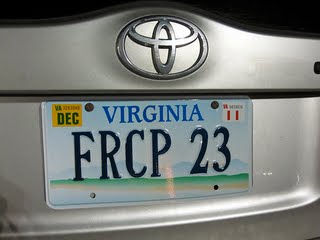I’ve hired a lawyer because I’m objecting to the settlement of a Yahoo! class action regarding click-fraud. And I’d like you to meet that lawyer, though many of my regular readers already know something about him. His name is Ted Frank, a man the Wall Street Journal once called a “leading tort-reform advocate.” He has promoted ideas that, I think, would close the courthouse for many. He is a frequent contributor to Overlawyered, a member of the conservative Federalist Society, and was, until recently, a fellow at the conservative American Enterprise Institute where big corporations seem to get a lot more favor than Joe Sixpack.
So why’s a guy like me, that does personal injury litigation for plaintiffs, consorting with the likes of Ted, who often rails against trial lawyers? Well as it happens, Ted is also one of the nation’s most knowledgeable people in the country in a niche of a niche. He doesn’t just know about class actions, but knows first hand how to object to a settlement if it fails to actually protect the class of people that are supposed benefit from the action.
Class actions can be a beautiful thing. Started pursuant to Federal Rule of Procedure 23, they allow large numbers of people with similar claims to bring an action together. Since without class status the suits wouldn’t be economical to bring, the suits tend to hold large wrong-doing companies accountable for conduct they might otherwise have gotten away with. Big companies hate class actions.
But if the settlement doesn’t seem fair, members of the class get to object. That might happen if the lawyers get a big fee relative to the financial benefits to the class victims. And Ted has a history of having done just that with a class suit regarding the video game Grand Theft Auto. He objected on his own time and his own dime, and it landed him in the New York Times, among many other places (Above the Law; Heritage Foundation; National Law Journal). Forbes later called him “a lawyer who tries to block class action settlements.”
Flush with the fame and fortune of his Grand Theft Auto objection, or at least the fame part, he left the American Enterprise Institute to start up the Center for Class Action Fairness, devoted to knocking down some of the settlements that don’t really benefit the class. Ted, in his own quirky way, had become a plaintiff’s lawyer, standing up for the little guy. He had, as Scott Greenfield aptly put it, found his groove. And that groove is the place between the class lawyers and the victims, and the conflict of interest that can occur.
So after Yahoo’s notice of settlement of the class action regarding pay-per-click fraud arrived in my mailbox — and having read it and realized I’d gotten the shaft — I knew who to call. I had received that notice because I had used Yahoo’s pay per click service from 2001 to 2005. I dumped the company in late 2005 when I strongly suspected click-fraud and the company did nothing about it. Over the years I spent about $5,000 per year on these ads, about $22,000 in total. I imagine that makes me a typical small business owner in the world of pay-per-click advertising.
There was just one bitty problem with the settlement that I took issue with. While the lawyers were asking for over four million dollars in legal fees, I got nothing. As in nada. Zip. Bupkus. And not just me, but if this settlement is approved the vast majority of the class will come away with checks for a similar amount: Zero.
 Now the Rules governing class action are supposed to prevent this from happening. Federal Rule 23(a)(4), asserts that “the representative parties will fairly and adequately protect the interests of the class” and Rule 23(g)(1)(B) provides that “An attorney appointed to serve as class counsel must fairly and adequately represent the interests of the class.”
Now the Rules governing class action are supposed to prevent this from happening. Federal Rule 23(a)(4), asserts that “the representative parties will fairly and adequately protect the interests of the class” and Rule 23(g)(1)(B) provides that “An attorney appointed to serve as class counsel must fairly and adequately represent the interests of the class.”
Here’s how they are trying to settle this case: The proposed click-fraud class settlement chopped up the thousands of paying customers into these three categories:
Then they decided to “settle” the case by paying a whole 20 bucks to those people and companies that formerly used Yahoo! but their business failed. The rest got stiffed. No, this didn’t make sense to me either. Until I realized that this group of defunct businesses is the least likely to fill out paper work and make a claim. So the payment isn’t just measly beer money to a few, but beer money that even fewer will try to collect.
Another aspect of the “settlement” is that Yahoo! will improve its service. Well jolly good for them. They’ve been destroyed by Google, so trying to figure out a better way to treat your customers makes sense. But don’t try to sell that as part of a settlement. Yahoo! does that for its own survival, and no other reason.
So I spent money on Yahoo! for the ads, yet I got nothing back in this settlement. I have, quite literally, nothing to lose by objecting to this settlement. From where I sit, the Rules were clearly violated in that the class representatives and the lawyers didn’t “fairly and adequately protect” my interests. I look forward to the response to my objection where the attorneys get to state in open court that my interests were protected by giving me nothing. That should be a fun hearing.
 And that’s why I contacted Ted. Sometimes strange alliances form in life. Ted Olson and David Boies, who fought opposing sides of Bush v. Gore, are now working together on the California gay marriage issue. Left wing political strategist James Carville married right wing political strategist Mary Matalin. And now, Turkewitz and Frank, together at last. Not quite Bogey and Bacall but you get the idea.
And that’s why I contacted Ted. Sometimes strange alliances form in life. Ted Olson and David Boies, who fought opposing sides of Bush v. Gore, are now working together on the California gay marriage issue. Left wing political strategist James Carville married right wing political strategist Mary Matalin. And now, Turkewitz and Frank, together at last. Not quite Bogey and Bacall but you get the idea.
One thing I learned early on as a lawyer was not to pick personal fights. I watched my father try a case once, and he and the other lawyer would knock heads in the courtroom, then go out for coffee. Personal animus is not helpful in any way for winning a case. But it can hurt you if you need to talk to the other side about anything from adjournments, to witness schedules to settlement. So I try not to do it in life, and I don’t generally do it here.
The differences Ted and I have are those of ideas, so it was easy for me to contact him. In fact, we often agree that certain cases are dumb and frivolous, but we differ on whether those anecdotes support changes in policies.
For this case, it was a no-brainer that Ted Frank should be my lawyer. And so he is.
- You can read our filing here: Turkewitz.Objection.Yahoo.pdf. Ted’s Memo of Law is followed by my Declaration of objection. And Ted’s post on the class action objection is here
- The objection of O.E. Express, a San Diego scuba and kayak shop, is here:o.e.express.objection.pdf
- The objection of Miles Technologies, a New Jersey computer software and services company, is here: Objection.MilesTechnologies.pdf
Stay tuned…
———————
License plate of Ted Frank’s car, via Byron Stier @ MassTorts
Links to this post:
Former Yahoo Advertisers Objecting To Class Action Settlement …
We’ve discussed in the past how the class action lawsuit process if often abused mercilessly. While the concept of a class action lawsuit can make a lot of sense, as you look at the details of many of the lawsuits, they do little to …posted by Mike Masnick @ December 16, 2009 8:59 PM
Class action objection
Eric Turkewitz, noted plaintiff’s-lawyer blogger, teams up with Ted Frank, noted Overlawyered.com blogger, to object to a Yahoo! class action settlement. Tags: class action settlements, legal blogs, Ted Frank …posted by Walter Olson @ December 15, 2009 8:50 AM

Good luck to you! I hope you’ll keep us posted on progress.
I would be very interested in hearing Ted’s view on this. If it’s close to yours I would be surprised. But, who knows.
I would be very interested in hearing Ted’s view on this.
I think it’s fair to say Ted’s view is set forth in his brief supporting my objection.
While the two of us might disagree regarding some other class action settlement is fair or not, we are clearly in accord that this one is the pits.
Pingback: Linkworthy – New York Personal Injury Law Blog